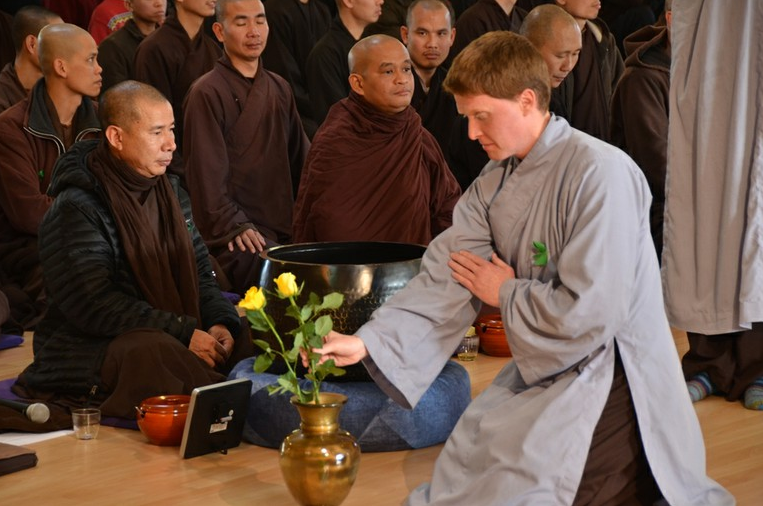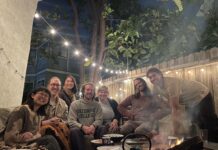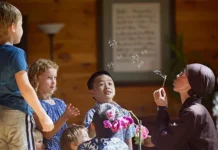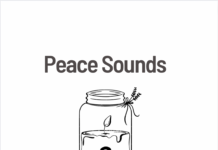In this Part I of a 2-part monthly series, Karim Manji from Wake Up London interviews Brother Dao Kien from Upper Hamlet, Plum Village, about his involvement in Wake Up and his decision to become a monastic

Karim: How long have you been in Plum Village?
Brother Dao Kien: I’ve been here for about two years. I came in July 2014 and did a six-week internship in the bookshop during the summer retreat. Then I went home and returned in October 2014 to consider the 5-year monastic program. I began a one-year aspirancy period about six weeks later in the middle of November and I was ordained as a novice monk in December 2015.
Karim: Before you chose the monastic path, can you tell us about your experiences with Wake Up?
Brother Dao Kien: I had no idea what I was getting myself into when I attended my first Sangha meeting (which wasn’t a Wake Up Sangha) in Cork, Ireland. I thought it was just a simple meditation group meeting once a week. I never expected to be getting involved in a whole new way of life with the Plum Village tradition. When I went there, someone in the Sangha meeting mentioned a Wake Up retreat happening near Dublin the following weekend and I thought, why not give it a try.
I was used to being a doing-type person, but not a being-type person.
I attended the Wake Up retreat the following weekend in Dublin (Autumn 2013) and was really amazed by the transformative power of the collective energy of the whole Sangha that weekend. I felt like something had changed within me in just two days, and it gave me space to reflect on the priorities I had made till then in my life. Meditation had been something I was doing 30 minutes a day to relieve some stress, but after that I started to see mindfulness as a whole new way of being in the world. I was used to being a doing-type person, but not a being-type person (I suppose that’s why they call us “human beings” and not “human doings”.) I felt mindfulness offered a path to be more fully alive to life. I knew, at that stage, that I wanted to take this further, but I did not really know how. I felt blessed to have a Sangha in Cork that could support me each week when I strayed away from the path.
I remember being in a Dharma sharing family that weekend and meeting one of the monastics who is now a good friend in Plum Village. I was sort of surprised at how “normal” the monastics were. I was expecting something different. The two brothers there were the same age as me and had also very similar life experiences as me. I could not see myself becoming a monastic for my life, but when one of them talked about the 5-year monastic program, I think it planted a seed. I saw it as a good opportunity to really immerse myself in an environment where establishing a strong mindfulness practice is the main priority. I could also see that my habit energies were very strong and were constantly pulling me in a different direction to where I really wanted to go and who I wanted to be in the world.
That weekend, they put us in Dharma sharing families by location and I got to know many people from Cork and Kerry really well. It felt wonderful to be around people who were having the sort of conversations that I felt were not being had in my everyday life. It felt like everyone just took off the mask that we show to the world (like on Facebook) and were willing to be vulnerable and share what was on their hearts. I also felt a kind of relief because I think I was starting to see through the illusion of what our society claimed to offer in terms of what brings happiness and so did many of the other retreatants. I knew I wanted to spend more time with these sorts of people, so we decided to establish a Wake Up Sangha in Cork. It started the next week in Poppy’s apartment and then we found a free space in University College Cork (UCC). It is still running each week for two years, so I am really happy to have been part of that. I think the Wake Up movement will always be in my heart.
Karim: That seed was planted very early, but when did it become really concrete that you were going to do the 5-year program?
Brother Dao Kien: I think it is a gradual process. I think the seed was planted during that three-day retreat near Dublin, but it was not until I visited Plum Village as part of a Wake Up Ireland Sangha retreat in Spring 2014 that my aspiration began to solidify. Hong-An managed to organise a week in Plum Village for about 35 of us to come from Ireland (Wake Up Cork, Dublin, Galway and Belfast) and she also managed to organise a discount (I’ll go anywhere for a discount 🙂 ). We are really grateful to her for that and her continuing effort with Wake Up International.
That week was one of the best and most transformative weeks of my life, especially because most holidays involved alcohol up until then in my life. I didn’t have any expectations before I came, and I think that helped. I had very similar experiences like in the Wake Up retreat in Dublin, but this was a more intensified experience. I talked with some of the monastics that week about the 5-year program. I think there was a huge doubt about doing something like that, so I made the commitment that I would come back for the summer retreat and volunteer to do some work with the monastics. Then just leave it open.
It is difficult to have compassion without understanding, so I felt that understanding my own difficulties is necessary if I am going to offer a compassionate and non-judgmental space for clients in the future.
After the summer retreat had ended, I was pretty sure I wanted to do the 5-year program, but I thought I would go back to Plum Village again for a few months in Autumn, spend some time in Vietnam with one of the brothers, go back in Spring again and then decide. I knew it would also be difficult for my family to accept (a Catholic priest would have been easier than a Buddhist monk 🙂 ), and I thought this would be a better solution as it would give them more space to get used to the idea and also give me more time to decide whether I would do it or continue on the psychology path. Somehow, I thought that I would be a far better psychologist (brother, son, husband, father etc.) if I took time to get to know myself better and also learned how to take care of myself. It is difficult to have compassion without understanding, so I felt that understanding my own difficulties is very necessary if I am going to offer a compassionate and non-judgmental space for clients in the future.
When I came back at the end of September, everything within me said, “It’s the right thing to do in your life right now. Just go for it!” But my mind was still trying to give me reasons about why I shouldn’t do it. In the end, I thought “Why not do a 5-year program?” Do it and see what happens. So I decided to not go to Vietnam. I thought, “Why turn a 5-year programme into a 6 or 7-year programme by considering it for another year or two?” I also started to see it as being really necessary for whatever I wanted to do in the future in my professional or personal life. They also offered at the start of the 5-year monastic program a 1-year aspirancy period to give a chance for you to see what monastic life is like. It’s perfectly fine during that year if you decide that it isn’t for you. It was a period for the community to get to know me, and also for me to get to know the community and see if my monastic aspiration got stronger over the year or decide that it wasn’t for me. I think that was very helpful, knowing that I had that space for a year to explore before I went into the monastic life.
In the beginning of my aspirancy period, I had a lot of doubt, but by the end of the year I felt that I had befriended doubt.
At the end of the year as an aspirant, I was starting to experience some of the benefits of the practice that Thay had talked about many times in Dharma talks. In the beginning of my aspirancy period, I had a lot of doubt, but by the end of the year I felt that I had befriended doubt and now had space to look more deeply into how doubt had affected me in every area of my life up until then. One of the five powers is Faith, and I feel my faith was solidified over that year. I feel that I have a strong faith in the Dharma now to show me who I am, to help me to come through difficult times, and to help me to open up to the nourishing conditions around me in each moment. The Sangha also helps you every day with giving you the experiences you need to really see yourself. My practice involves being more open to these experiences. I feel that something (call it what you want, the cosmos, God, etc.) is always pushing me in the direction of waking up, but I spend most of my time resisting it. I feel a real surrendering has to happen before I can really wake up and hear the voice deep within myself.
I started to see recently how aversion to what is happening in the current moment and grasping at a different experience has caused me a lot of difficulties in my life. I think, unbeknownst to myself, I tried to control every area of my life so that everything was in a nice neat box, but now I see that the only real control I have is whether or not I am truly open and accepting of what is happening in the present moment even when the present moment is unpleasant. I feel the need for control has stopped me for so long from really being dynamically alive in each moment. The mind is so subtle sometimes that it can be difficult to notice the constant pushing (aversion) and pulling (grasping) in your mind right in the present moment.
Before I came to Plum Village, I felt I had experienced a lot of what life had to offer (sometimes maybe a little too much 🙂 ), but I was left feeling little bit numb or sedated. I mean, I was doing all the nice things that life had to offer, but somehow they did not have the same appeal anymore. I started to see now that I was never really at home with myself (body, mind etc.). I am starting to understand the Plum Village seal of “I have arrived, I am home” much more deeply now.
The feeling of numbness, of being slightly sedated to life has definitely vanished, but the practice is long process and sometimes a very painful process of self-discovery.
I think when I started the aspirancy, I started to really feel unpleasant feelings for the first time without covering them with consumption (movies, internet, alcohol etc.) and at times it was really difficult. I could see that if I really wanted to feel more alive, then this was a necessary part. There is a paradox I feel in that I have definitely felt worse that I have every felt in my life in Plum Village, but I have also never felt better. I think there is great learning in a paradox. I suppose this is what it really means to be alive. To truly experience all life has to offer in each moment, and I definitely feel more alive than I felt before I came even if that is sometimes quite difficult. The feeling of numbness, of being slightly sedated to life has definitely vanished, but the practice is long process and sometimes a very painful process of self-discovery. You definitely have to be a brave person to continue each day and so my admiration for monastics here has grown.
Click here to read Part II of this interview, where Brother Dao Kien reflects on life as a monastic novice and having a relationship with yourself.

















